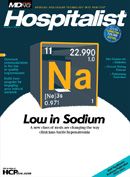Publication
Article
MDNG Hospital Medicine
Net Guide: Chronic Kidney Disease
We searched the Internet for chronic kidney disease resources so you don't have to.
//The Educated PatientTM
Talking to Your Family about Kidney Disease
Because kidney disease runs in families and can be better managed if detected early, the National Kidney Disease Education Program provides this educational resource for those who have been diagnosed with the condition. Patients can download “Kidney Sundays,†a toolkit designed to help raise awareness in the patient’s faith community about the risks for kidney disease and the importance of getting tested, and “Make Health a Family Reunion Affair,†a guide that “has everything African-American families need in order to talk about the connection between diabetes, high blood pressure, and kidney disease.†Also included are links to educational videos, fact sheets and brochures.
Link code: h4321
I Heart My Kidneys
The American Association of Kidney Patients created this site to empower people with chronic kidney disease (CKD) to be more active in their own care. Here, patients can learn about the functions of the kidney, the risk factors for developing CKD, tests used to diagnose the condition, the five stages of CKD and what happens during each stage, and what can be done to slow down or stop kidney damage, and how to manage CKD-related anemia. The site also includes a glossary of terms and a chart that patients can print out to keep track of lab tests.
Link code: h4322
//Online CME
Disordered Mineral Homeostasis + Chronic Kidney Disease + Health Care Reform = Increased Morbidity and Mortality in the Patient with CKDCredits: 2.00
Fee: None
Expires: June 7, 2011
Multimedia: Audio/Video
This case-based activity will describe the pathologic mechanisms that underlie chronic kidney disease-mineral and bone disorder (CKD-MBD), which occurs in nearly all patients with CKD, and will review evidence-based strategies in the context of current “Kidney Disease: Improving Global Outcomes†clinical practice guidelines. It will also “explore methods to manage CKD-MBD in the current healthcare environment and discuss reimbursement issues that might potentially impact care for these patients.â€
Link code: h4331
Walk That Line: The Challenge of Hypoglycemia in the CKD Patient with DiabetesCredits: 1.00
Fee: None
Expires: February 28, 2012
Multimedia: Audio/Video
After viewing this webcast, participants will have a better understanding of the causes and symptoms of hyper- and hypoglycemia in patients with CKD and how to prevent these episodes; the risks of uncontrolled hyper- and hypoglycemia in the CKD population and how to respond to the potential effects; the principles of interdisciplinary management of diabetes in the CKD patient and the timing of referrals to better integrate different practice skill sets into patient care; and the guidelines for management of diabetes in order to achieve lower HbA1C levels in patients.
Link code: h4332
//eAbstracts
Chronic Kidney Disease-Epidemiology Formula and Model for End-Stage Liver Disease Score in the Assessment of Renal Function in Candidates for Liver TransplantationJournal: Transplantation Proceedings (May 2010)
Authors: Tinti F, Lai S, Mordenti M, et al
Purpose: To evaluate different methods for estimating glomerular filtration rate in patients with end-stage liver disease who have been candidates for liver transplantation for more than one year.
Results: In their evaluation of 52 cirrhotic patients, the authors concluded that “renal function in cirrhosis should include an evaluation of hepatic function.†Modified diet renal disease and chronic kidney disease-epidemiology “seemed to be the more accurate formula to evaluate renal function in relation to hepatic function.â€
Link code: h4351
//Clinical Trials
Role of Donor Genetics and Recipient Genetics in Kidney Transplant OutcomesStudy Type: Observational
Age/Gender Requirement: 18 years+ (male/female)
Sponsor: National Institute of Diabetes and Digestive and Kidney Diseases (NIDDK)
Purpose: NIDDK is looking to study outcomes of kidney transplant in donors and recipients of African descent in order “to better understand the effects of this genetic variation on the success of kidney transplants.â€
Link Code: h4361
PHARMA FOCUS
Zemplar (Paricalcitol)
Clinical Trials
Vitamin D Deficiency in Chronic Kidney Disease (CKD) PatientsStudy Type: Interventional
Age/Gender Requirement: 18 years+ (male/female)
Sponsor: Salem Veterans Affairs Medical Center
Purpose: To compare the effects of vitamin D replacement using oral ergocalciferol versus paricalcitol on parathyroid hormone (PTH) levels in patients with stage 3 and 4 CKD and vitamin D deficiency or insufficiency.
Link code: h4362
eAbstract
New Therapies: Calcimimetics, Phosphate Binders and Vitamin D Receptor ActivatorsJournal: Pediatric Nephrology (April 2010)
Authors: Cannata-AndÃa JB, Rodriguez-GarcÃa M, Román-GarcÃa P, et al
Purpose: To determine whether calcimimetics, novel phosphorus binders, and novel vitamin D receptor activators are efficacious in children with chronic kidney disease.
Results: New vitamin D receptor activators such as paricalcitol were found to be as effective at suppressing parathyroid hormone as traditional vitamin D receptor activators, but with a better and safer profile. “Their use in children with chronic kidney disease has revealed similar responses to those of adults,†say researchers, and therefore shows potential to “improve the management of mineral and bone disorders in children with chronic kidney disease.â€
Link code: h4352
From the HCPLive Network
Racial Disparities in Black and White Children with Chronic Kidney DiseaseDespite receiving the same treatment, black children with chronic kidney disease suffer from more severe anemia than white children, according to a new study from Johns Hopkins Children’s Center.
http://www.hcplive.com/pediatrics/articles/racial_disparities_in_children_with_CKD
‘Silent Strokes’ Linked to Kidney Failure in Diabetics
In patients with type 2 diabetes, silent cerebral infarction—small areas of brain damage caused by injury to small blood vessels—signals an increased risk of progressive kidney disease and kidney failure, according to a study appearing in the Journal of the American Society Nephrology.
http://www.hcplive.com/endocrinology/articles/diabetes_silent_stroke_kidney_disease






